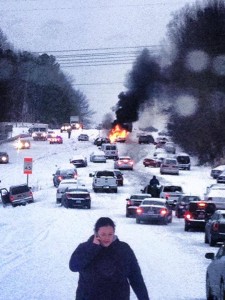As the U.S. East Coast prepares for snowmageddon 2016, my friend Andrea Weigl of the Raleigh News & Observer called me to chat about food safety steps when the power goes out. I mentioned the need to check temperatures. And that we stock up on beverages.
▪ Once your power goes out, start tracking time. Refrigerators built within the last 20 years actually do a good job keeping food cold even without power. Keep the door closed as much as possible. After eight hours, check the food’s temperature with a tip-sensitive digital thermometer. (If you don’t own one, now might be a good time to buy one.)
▪ You do not want food to be above 41 degrees for more than 4 hours. That’s when bacteria can grow and make people sick.
▪ Fill empty space in your freezer with ice to help frozen food last longer.
▪ Foods you should worry about include meat, cooked foods, sliced melons, sliced tomatoes, sprouts, soft cheeses and dairy products excluding yogurt. Foods that you don’t have to worry about include uncut fresh fruits and vegetables, bread, rolls, bagels, cakes without cream or custard, cookies, muffins, hard cheeses, condiments and dressings.
▪ If the food temperature is worrisome, transfer food to ice- or snow-filled coolers. Just be sure to keep coolers in a cool place, away from direct sunlight.
So what does Chapman stock up on in preparation for storms?
Beer and wine, he told us.
Now that is some very good advice.
